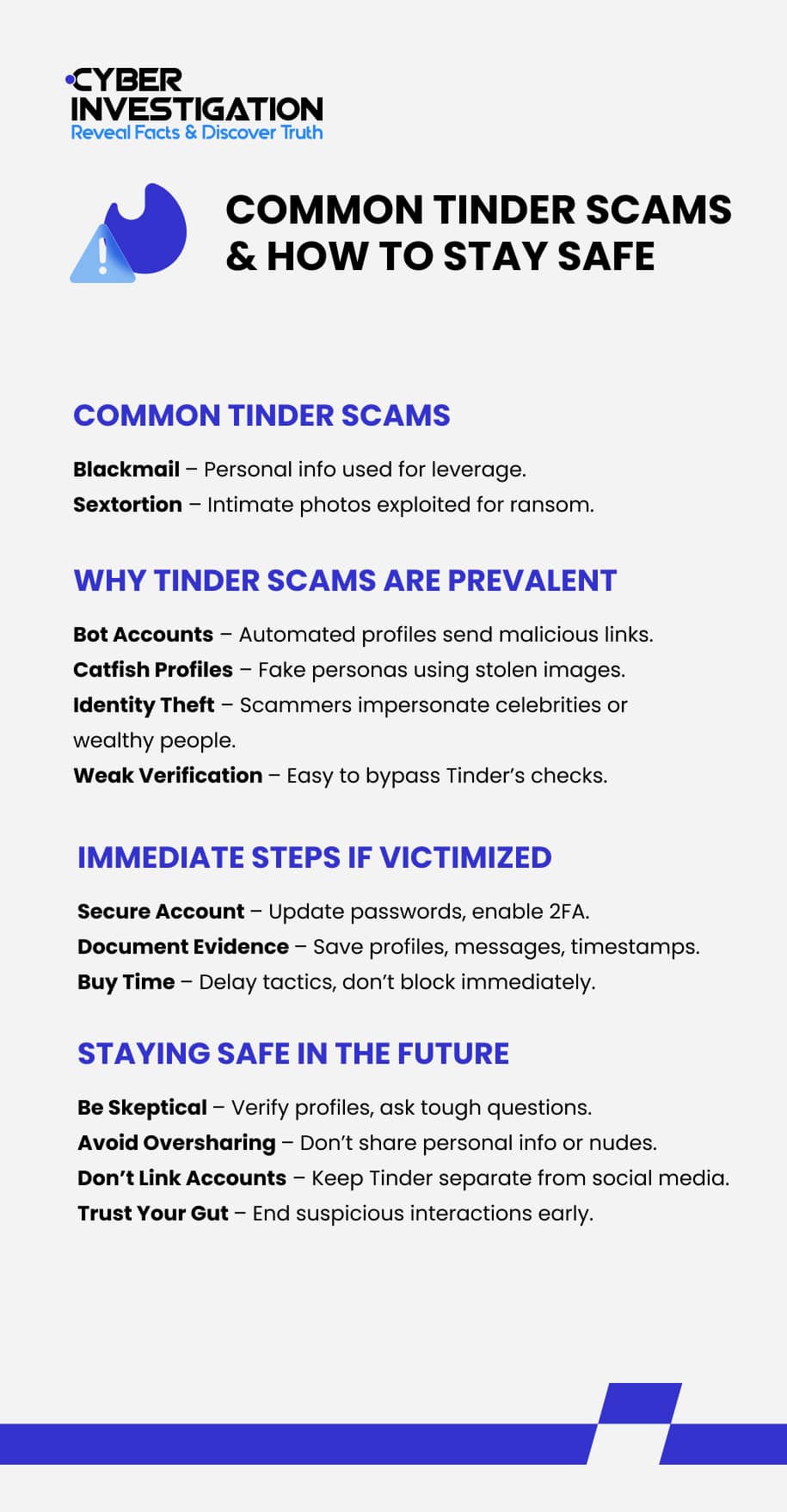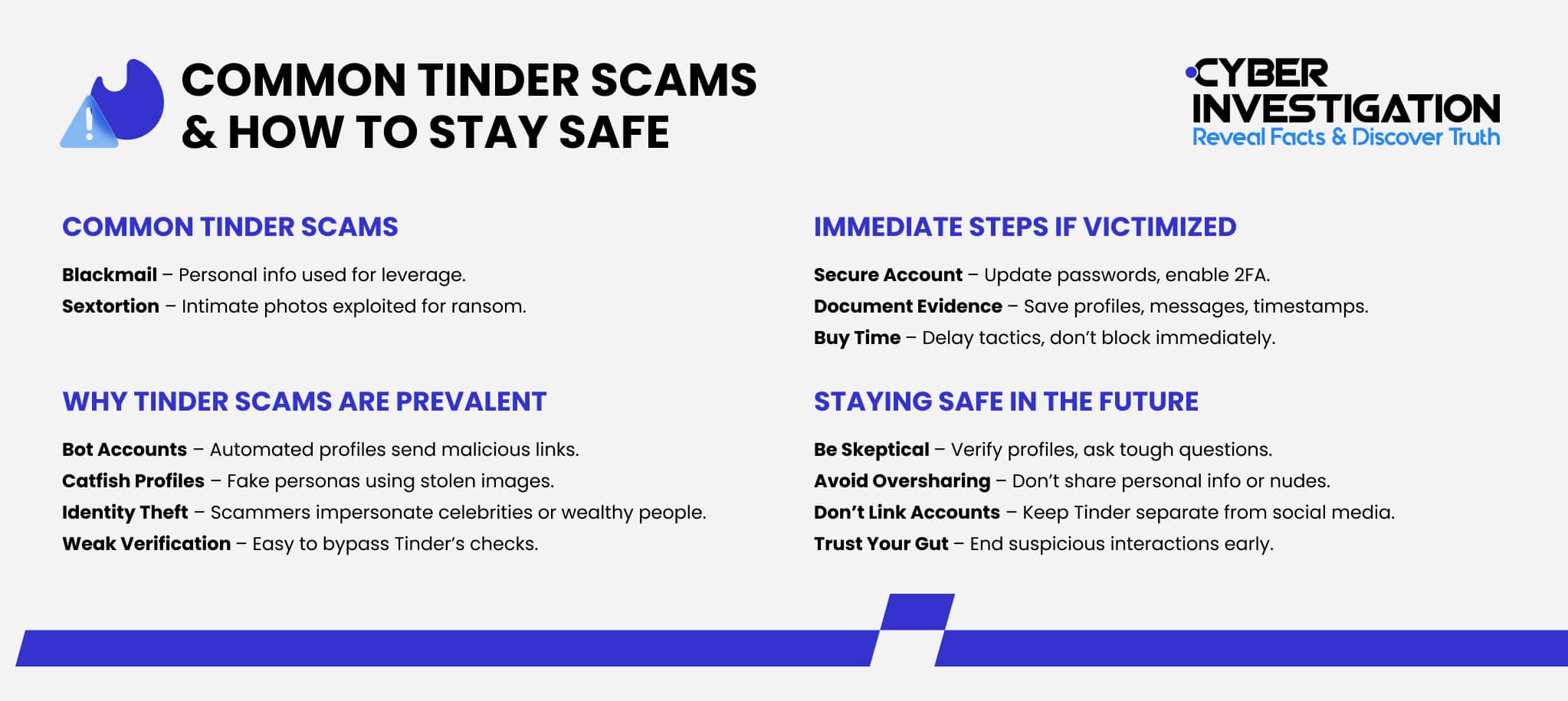Tinder has become the face of online dating in the United States. A 2024 survey found that Tinder is the most recognizable dating app in the country with 73% brand awareness. Tinder is not only recognizable — it’s also the most downloaded dating app in the world. This all culminates in a perfect environment for scammers to scout their next victim. Keep reading to learn what to do if you fall victim to scams like blackmail on Tinder.
Common Scams on Tinder
The possibilities for a scammer are virtually endless on Tinder. By appealing to their target’s desire for love, scammers can innocuously launch the scheme of their choosing. The following are the Tinder scams our experts handle most frequently.
Blackmail on Tinder
It’s no surprise that blackmail on Tinder is a massive issue. Whether in person or online, dating lends the opportunity to ask personal questions. Afterall, you are looking to get to know a person that could potentially be your next partner. Knowing this, blackmailers will use this opportunity to gain leverage for their schemes.
Sextortion on Tinder
It’s not unusual for a conversation on Tinder to get spicy in short notice. It has earned a reputation as one of the best platforms to find hookups rather than long-term relationships. As such, many users join with the intent to get down to brass tacks quickly. Sextortionists also know this, and they use the platform to initiate intimate image exchanges.


Why are Tinder Scams So Prevalent?
As we’ve already covered, Tinder users are looking for love — or possibly just lust. This can blind their better judgement and lead them to go along with suspicious requests they normally wouldn’t. Furthermore, it’s incredibly easy to create a fake account on the platform. This can be done in a few different ways.
- Bot Accounts. These accounts are actually run by automated software that generates messages to a mass number of targets. They often send links to malicious websites that harvest credentials or contain malware.
- Catfish Profiles. These profiles steal or generalate images to create a fake persona. Scammers will often do their homework on their targets. They pull information from your online accounts to craft the illusion of your perfect match.
- The scammer may opt to steal another person’s identity rather than create a fake one. They will typically use attractive and wealthy people, such as celebrities.
To combat these fake accounts, Tinder rolled out a verification process in 2020. However, this is not mandatory to create an account, and scammers have found ways to circumvent the verification software.
What to Do If You Become a Victim on Tinder
Falling victim to any scam, especially from someone you thought you could trust, is a terrifying experience. It’s completely normal to feel overwhelmed by the onslaught of emotions you are experiencing. However, it’s important to remain calm and collected. You can get through this, and here’s how our experts suggest you proceed.
Immediate Steps to Take
It’s important to respond to scams like blackmail on Tinder immediately. Time is of the essence, but the wrong decisions can escalate the situation. Our analysts recommend the following steps in the immediate aftermath.
- Secure Your Account. The scammer may not have compromised your Tinder account, but it’s best to be proactive. Update your passwords on any accounts that could link back to your Tinder profile.
- Document Evidence. This includes the scammer’s Tinder profile, any messages exchanged between you, and timestamps of the incident. You will need this to recreate a timeline of the scam.
- Buy Yourself Time. Many people initially believe they should block the scammer. However, this often leads to retaliation in cases of blackmail and sextortion on Tinder. Instead, maintain communication using delay tactics while you get professional help.
Reporting the Scam to the Proper Authorities
You should report scams on Tinder to the platform’s system administrator. To report a user on Tinder, you’ll need to do the following.
- Open the profile or chat that you wish to report.
- Select the three dots (…) in the top right corner.
- Select the “Report” option.
Additionally, it’s important to notify law enforcement. Begin with your local police. You can file a report by going into the station, and many precincts accept reports online or over the phone. If they don’t have jurisdiction to pursue the case, you should move forward to a national agency.
The FBI is responsible for handling reports of cybercrimes in the United States. You can learn more about reporting to the FBI in our article covering the Internet Crime Complaint Center. However, in cases of sextortion on Tinder, you should report to the National Center for Missing and Exploited Children if the victim was under the age of 18.
Working with Professional Cyber Investigators
The process we’ve outlined above may seem complex, and victims are under enough pressure as it is. That’s why it can be extremely beneficial to seek the assistance of digital forensics and cybersecurity experts.
These professionals can help you collect evidence that wouldn’t be recoverable alone. This includes metadata embedded within the code of your interaction that can lead to the perpetrator’s identity and location.
Not only can they support your report and subsequent legal action, but they can also help secure your network. They can determine the scope of the attack and provide safe practices and security measures for the future.
Staying Safe: Avoiding Tinder Scams in the Future
Regardless of if you’ve been scammed on Tinder in the past, it’s important to be proactive about your safety. What you’ve read so far may make you hesitant to use the platform, but it’s possible to have a secure experience. Consider the following suggestions to avoid scams like blackmail on Tinder.
- Be Skeptical. Approach each interaction on Tinder with a healthy level of skepticism. Reverse-image search the images on their profile and ask them specific questions that are difficult to fake answers to.
- Avoid Oversharing. A new online romance can be exciting and make you want to throw caution to the wind. However, you shouldn’t disclose personal information. Sexting may be exhilarating, but sending intimate photos can open the door to sextortion on Tinder.
- Don’t Link External Accounts. It may seem innocent to connect with your new match on social media and other platforms. Unfortunately, scammers often use this as a means to gain intel on their target. It’s best to keep your online accounts separate. You should even consider using an independent email address for your Tinder account.
- Trust Your Gut. In some cases, it’s difficult to pinpoint what exactly seems peculiar about an interaction on Tinder. But if something feels off, you shouldn’t ignore it. It’s safer to move on from the interaction and avoid a potential scammer.
And if you ever need help dealing with a scam on Tinder, Cyber Investigation is here to help. You can contact our Dating Scams Helpline 24/7 to connect with one of our specialists and plan your next step.







